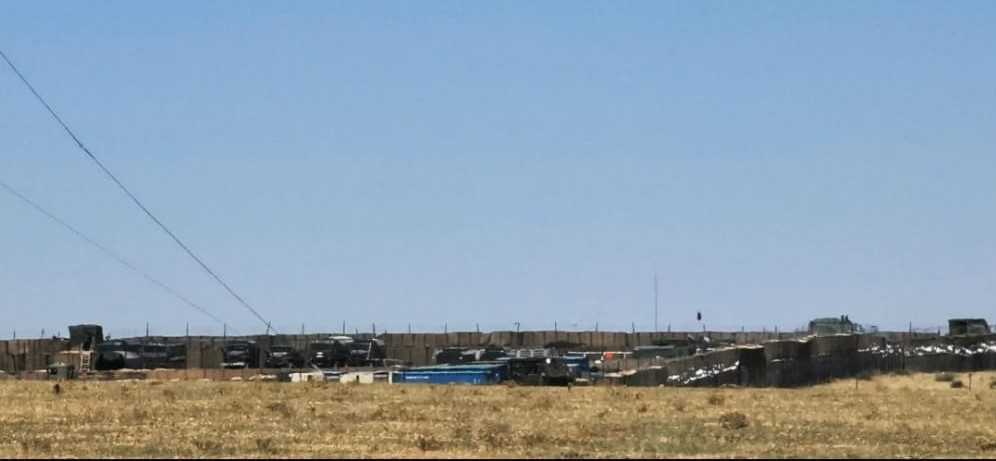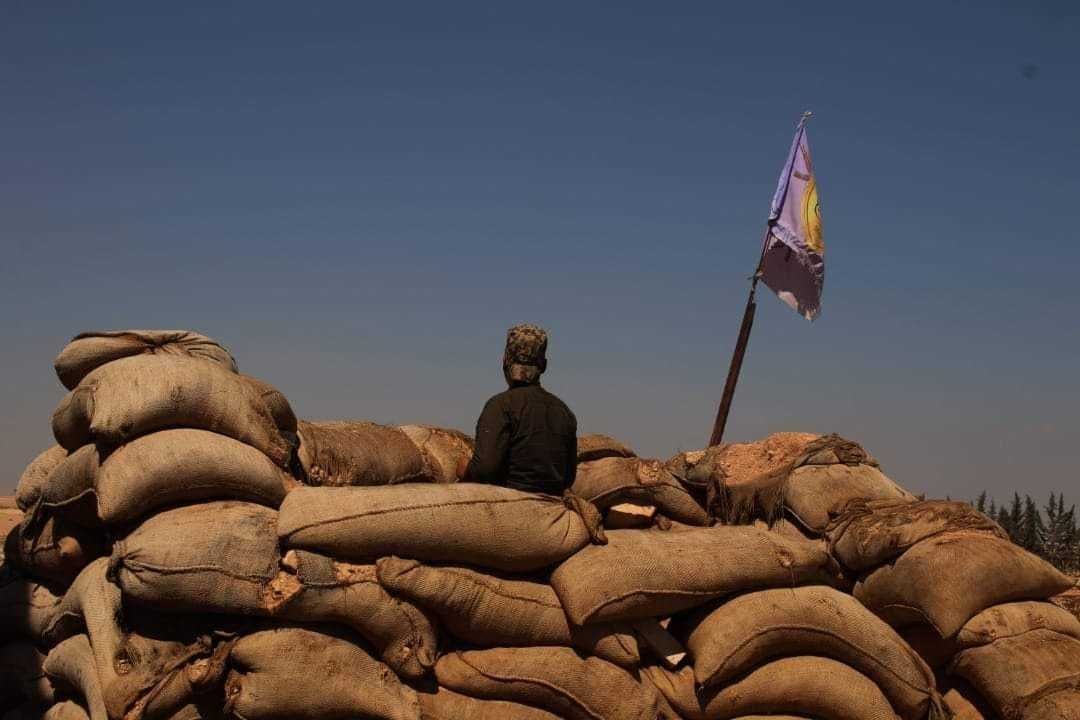Allied with Damascus, SDF prepares for Turkish operation in northern Syria
The SDF is preparing for a military confrontation with Turkey by allying with Damascus, pressuring international backers and declaring a state of emergency. Civilians are waiting anxiously, stocking up on supplies, and considering escape routes.
21 July 2022
PARIS — The Syrian Democratic Forces (SDF) have established joint military operations rooms with the Syrian regime in the northern Aleppo countryside cities of Manbij and Tel Rifaat to counter Turkey’s expected cross-border military operation, an SDF military source revealed, following the announcement of an alliance with Damascus earlier this month.
Damascus and the SDF are also working to “establish a new joint operations room at the 93rd Brigade in Ain Issa,” said the military source, a member of the Manbij Military Council (MMC) who is participating in a joint operations room with the regime. He asked not to be named because he is not authorized to speak to the media.
“550 regime forces entered” SDF-held areas “with heavy weapons, rocket launchers, tanks and other weapons,” the source said. The forces deployed to Manbij, Kobani (Ayn al-Arab), Ain Issa and Tel Rifaat, and are the first batch “of 3,000 forces, officers and officer-rank [personnel] who will enter the region,” he added.

A military base in Manbij where a joint operations room has been established with the Syrian regime, 16/7/2022 (Syria Direct)
The General Commander of the SDF, Mazloum Abdi, announced on July 15 that regime forces were allowed to deploy in areas of influence held by the Kurdish-majority SDF forces in northeastern Syria. He said it was Damascus’s duty “to defend Syrian territory.”
Abdi’s remarks came during a press conference held at the SDF General Command headquarters at Istirahat al-Wazir, near the northern Hasakah town of Tel Baydar. He stressed that his forces are prepared to face the upcoming Turkish military operation, and that they are ready to engage in open war because “we have nowhere left to withdraw to.”
In March, Turkish President Recep Tayyip Erdoğan said Ankara would launch a cross-border operation into northern Syria targeting “areas which are centers of attacks to our country and safe zones.”
Ankara’s military operation is expected to target the Manbij and Tel Rifaat areas of northern Aleppo province. But the SDF intends to open all fronts in the event of an attack, including Ain Issa, Tal Tamr and Kobani, the MMC source said. “This battle is different from those that came before in Afrin and Ras al-Ain,” he added.
US stance on the operation
The United States of America—the main backer of the SDF in Syria—has renewed its rejection of a Turkish military operation in the country’s north. “ISIS [Islamic State] is going to take advantage of that campaign, and not to mention the humanitarian impact,” US Deputy Assistant Secretary of Defense Dana Stroul said on July 13.
But “calls by the international coalition, the US and international stances are insufficient to deter threats and de-escalate,” Abdi said at his July 15 press conference.
Within US efforts to stop Turkey’s operation, Washington reportedly offered proposals to the SDF including “handing over some areas east of the Euphrates to dispel Ankara’s fears, in exchange for keeping other areas neutral,” Lebanese newspaper Al-Modon said on July 7, citing unnamed sources. Kurdish Facebook pages also circulated news this month that the MMC refused a US request to hand over Manbij.
The MMC source denied reports that Washington asked the council to give up the city, and shared an internal voice recording he said was between two MMC leaders denying the US offer. Syria Direct could not independently verify the recording’s authenticity.
The same source expects, “based on intelligence information,” that “the fate of the Turkish operation is linked to Erdoğan’s visit to Iran.” The Turkish president participated in a trilateral summit in Tehran on Tuesday that brought him together with Russian President Vladimir Putin and Iranian President Ebrahim Raisi. Media reports surrounding the summit said Ankara aimed to get a green light from Moscow for a military operation in northern Syria.
In a joint statement released following Tuesday’s summit, the three leaders “expressed their determination to come together to combat terrorism in all forms and manifestations.” Ankara considers the Syrian Kurdish People’s Protection Units (YPG), the main component of the SDF, to be an extension of the Kurdistan Workers’ Party (PKK), listed as a terrorist organization by Turkey and the US.
The leaders also “rejected all attempts to create new realities on the ground under the pretext of combating terrorism, including illegitimate self-rule” and said they “stand against separatist agendas aimed at undermining the sovereignty and territorial integrity of Syria as well as threatening the national security of neighboring countries.”
Watching and waiting
After the SDF announced its alliance with Damascus to repel Turkey’s attack and declared a state of emergency in all areas of its control in northeastern Syria this month, residents in the region—especially in Manbij and Tel Rifaat—are in a state of anxious waiting.
People are worried about security and the economy, Saddam al-Hassan, who lives in Manbij, told Syria Direct. Fears are reaching their peak among young men in particular, after “the regime and Russia reinforced their positions on the city’s borders.” Al-Hassan fears “detentions by the regime, or us being conscripted for compulsory military service if the regime takes control over the city.” He also worries Manbij could face “a fate like the rest of the areas the Turkish-backed opposition factions took over, in terms of violations, looting and theft.”
Syrian National Army (SNA) factions, with Turkish support, took control of Afrin city in northwestern Idlib province during Operation Olive Branch in January 2018, a previous cross-border operation. After the YPG were expelled, the area saw widespread displacement of the city’s original inhabitants, especially Kurds, following a series of violations including looting, theft, extortion and taxes imposed by SNA forces.
Civilian fears in northern Syria are bolstered by what happened in Afrin, as well as later violations by all sides against residents of Ras al-Ain and Tal Abyad, which Ankara-backed forces took control of during Operation Peace Spring in October 2019.
While there is discontent among some civilians towards the SDF and the Autonomous Administration in North and East Syria (AANES), which administers SDF-controlled areas, “due to forced conscription and the high cost of living,” many prefer to remain under SDF control. “Things are somewhat stable, unlike the security chaos the Turkish-backed factions’ areas are experiencing,” al-Hassan said.
Kobani, another border area with Turkey which may be on Ankara’s list of targets, has also seen instability amid talk of an approaching operation.
“The Turkish operation is the talk of the street today in Kobani,” said Amal Ati, who works at a humanitarian organization in the city. People are divided “between those who say there is no need to fear the operation because it is limited to Manbij and Tel Rifaat, and those who warn Kobani is one of the targets.”
Although Turkish threats have not led to displacement in border areas so far, “everyone is on alert,” she told Syria Direct. “We could flee to Hasakah if our city is bombed.”
“Our options are limited,” al-Hassan said. He is considering “fleeing to Raqqa city or Tabqa, which is the choice of most people I know in Manbij.”
‘State of emergency’
The AANES General Council declared a state of emergency on July 6 in preparation for Turkey’s military operation. The announcement stated “the 2022 budget will be used for emergency measures, such as equipping shelters, camps and hospitals, digging tunnels and storing food supplies in all areas of north and east Syria.” The AANES 2022 budget is estimated at around $981 million.
The state of emergency declaration comes amid deteriorating living conditions for residents of northeastern Syria, exacerbated by a fuel and bread crisis hitting the region.
The state of emergency is “the first of its kind,” Siham Qaryo, Co-President of the AANES General Council, told Syria Direct. “Such a declaration has never before been made in the previous battles in Afrin and Ras al-Ain.” By declaring an emergency this time, the AANES aims to “take caution and direct those concerned to be prepared to resist.”
Al-Hassan, the Manbij resident, expects “worse living conditions if the military operation begins.” He has “stocked up on basic foodstuffs, most importantly flour,” expecting food prices to rise significantly in coming days.
The scene is the same in Kobani, where there is a shortage of some basic materials such as sugar, Ati said. There, too, people are “stocking up on basic materials, afraid the already deteriorating living conditions could deteriorate” further, she said.
The signs of the state of emergency have started to become clear on the ground, al-Hassan said. “Trench-digging operations have begun on the borders of Manbij, and dozens of young people have been conscripted.”
The state of emergency “will worsen the humanitarian situation, and impact the lives of civilians,” economic researcher Khorshid Alika told Syria Direct, “but the Autonomous Administration is forced to declare it.” He said the move is “a political decision to put the international coalition under pressure, and push it to support its allies in the region and call on Turkey to cancel the operation.”
The AANES faces “great economic challenges under the current international conditions—the energy crisis, inflation plaguing all countries of the world, and the decline of agricultural imports as a result of drought in AANES areas,” Alika said. “Using the budget to repel the military operation will come at the cost of the economic and living conditions of the area’s residents.”
While “AANES military and security expenditures rise at the cost of production and service expenses and employee salaries, civilians’ bill for basic expenses in the region will increase,” he said.
This report was originally published in Arabic and translated into English by Mateo Nelson.







